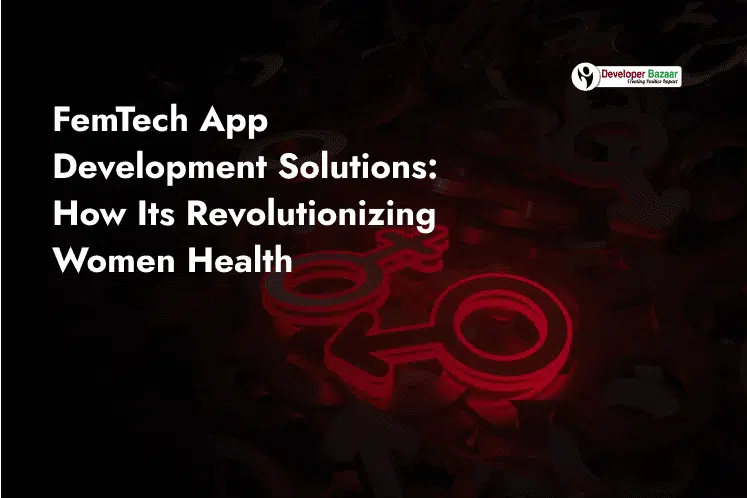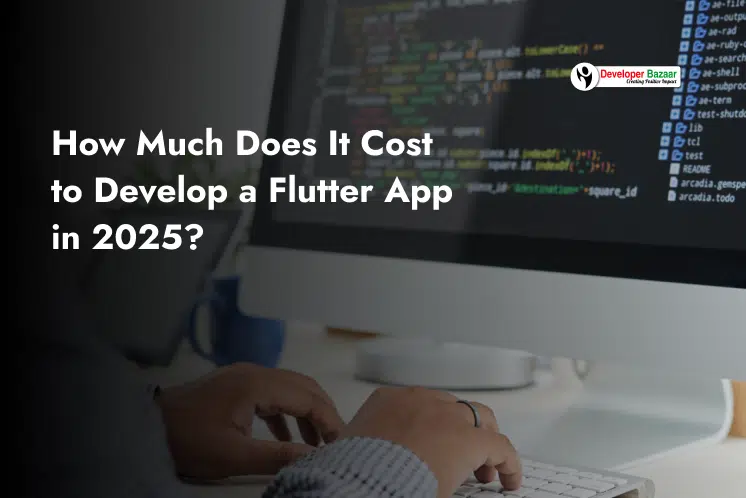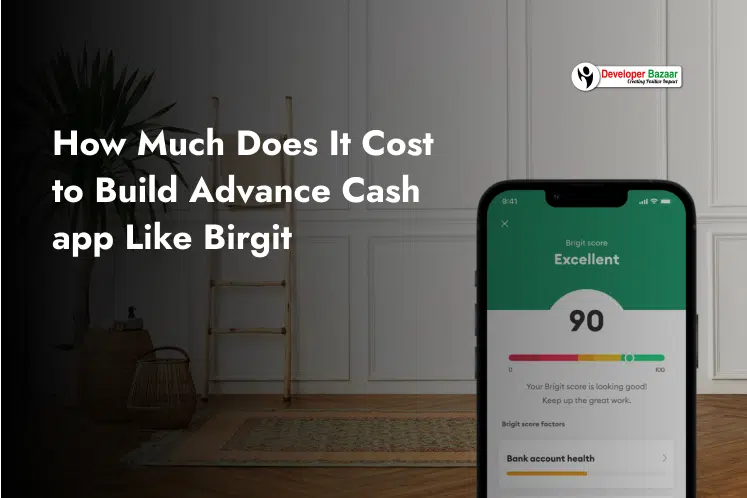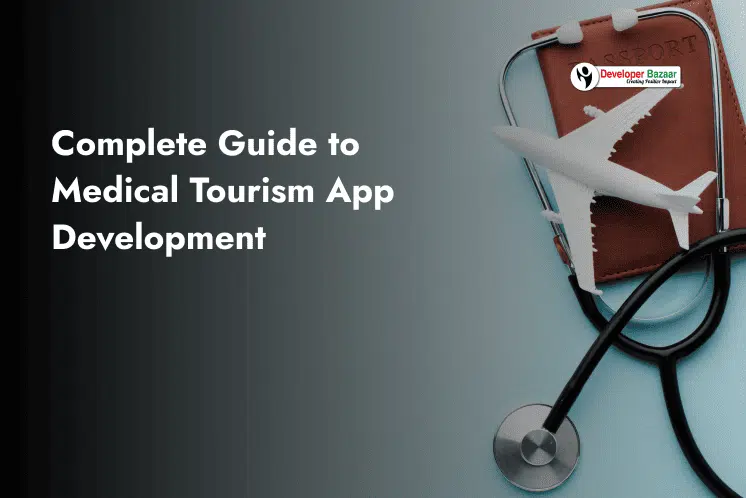Table of Contents
ToggleWomen’s health has often been overlooked in the tech and medical industries. But now, things are changing.
FemTech (short for “female technology”) is making it easier for women to take care of their health with smart apps, wearables, and online tools.
FemTech App Development Solutions helps in tracking periods to checking fertility, pregnancy, and menopause symptoms. FemTech is creating solutions just for women.
This article explores what FemTech is, why it’s growing fast, how it’s shaping the future of women’s healthcare and how to develop a FemTech App Solution.
What is FemTech?
FemTech is a word that means “female technology.” It includes products and services made to support women’s health and wellness. This includes:
- Period Tracking Apps
- Pregnancy and Fertility Tools
- Menopause Support Apps
- Sexual Wellness Platforms
- Wearable Health Devices
These tools help women track their cycles, understand their bodies, and manage health concerns in a simple and private way.
FemTech assists women by giving them the right tools and personalized health data at their fingertips.
The Rise of FemTech
FemTech is growing fast. In 2023, FemTech companies raised $1.14 billion across 120 funding deals. Experts believe the industry could be worth over $1 trillion by 2027. This shows how people and investors are finally paying attention to women’s health needs.
More women are using FemTech apps and products to stay informed and healthy. At the same time, more companies are creating new healthcare solutions for women.
Key Drivers Behind the Rise of FemTech

1. Filling Gaps in Healthcare
Many women’s health issues like endometriosis, PCOS, and ovarian cancer are often ignored or misdiagnosed. FemTech App Development helps by offering better ways to detect, monitor, and treat these conditions with the help of smart devices, apps, and AI-powered tools.
2. Giving Women Control Over Their Health
FemTech App Development and wearables let women track their health in real time. For example:
- Predicting ovulation for pregnancy planning
- Tracking period pain and mood changes
- Getting health tips based on body data
These features make it easy for women to understand their bodies and make informed choices.
3. Breaking Taboos Around Women’s Issues
Developing a Femtech App breaks the taboos for topics like menopause, fertility, and sexual health were once hard to talk about. But the Femtech app is changing that. With friendly and discreet health solutions, more women feel comfortable learning and talking about their health without fear or shame.
FemTech Market Overview (2025 to 2035)
The future of femtech looks very bright. Experts say the femtech market will grow from around $30.7 billion in 2025 to about $47.2 billion in 2035, with a steady growth rate of 4.4% every year.
This growth is driven by:
- Rising demand for femtech mobile apps
- AI integration in health trackers and devices
- Better telemedicine services for women
- High use of smartphones for digital health
- Growing focus on women-specific health research
Still, challenges remain. These include limited insurance coverage, outdated regulations, and social stigma. But there are many new opportunities, such as:
- Serving rural and underserved women
- Using AI for faster diagnosis
- Making affordable wearable health tech
Step-by-Step Guide to Develop a FemTech App
Developing a FemTech app needs smart planning and the right steps.
Below are the key stages to help you develop a successful women’s health app:
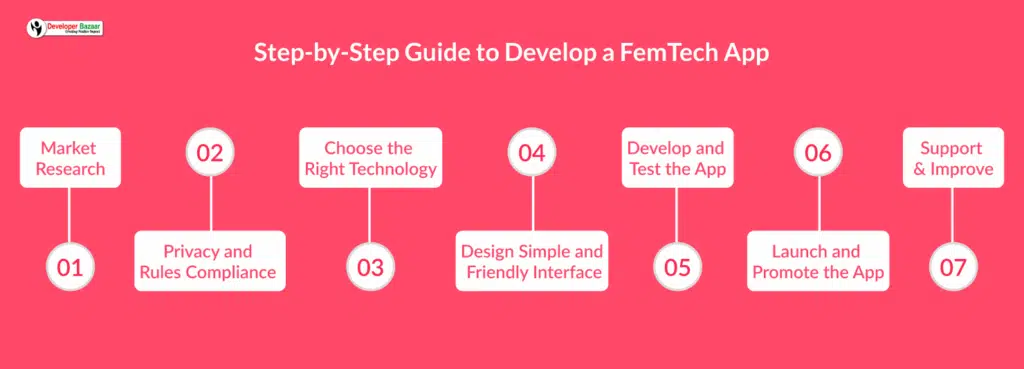
1. Market Research
Start by understanding what women users really need. Look at existing apps to see what works and where they are lacking like menopause care, fertility help, or mental wellness. Do surveys and study reports to know user pain points. This helps you build an app that truly solves real problems.
2. Privacy and Rules Compliance
Women’s health apps deal with personal and private data. Make sure your app follows laws like HIPAA (for the USA) and GDPR (for Europe). Use strong data protection tools like encryption and give users control over their data. Safe apps build user trust.
3. Choose the Right Technology
Pick tools that are secure, flexible, and easy to scale. Use trusted tech stacks like Node.js, Django, or React Native for faster development. Add AI and smart features later with tools that support it. Good technology makes your app strong and ready to grow.
4. Design Simple and Friendly Interface
Your app must be easy for all women to use. Create a clean layout, use easy words, and make sure it works for all ages and devices. Add privacy modes for personal features like cycle or fertility tracking. A friendly design keeps users coming back.
5. Develop and Test the App
Create a working version and test it with real users. Start with an MVP (minimum viable product) that includes the main features. Collect feedback, find bugs, and fix issues early. Testing improves user experience and saves money in the long run.
6. Launch and Promote the App
It’s time to share your app with the world. Use social media, influencers, and women’s health communities to reach the right audience. Highlight your app’s benefits like “easy period tracking” or “talk to doctors from home.” Good marketing gets more downloads.
7. Support and Improve
Don’t stop after launching, keep growing. Listen to user feedback, fix problems fast, and keep adding new features. Regular updates and good customer support show users you care and build loyalty.
Key Features to Include in a FemTech App
To stand out in the FemTech market, your women’s health app must have helpful and user-friendly features.
Here are the most important ones:
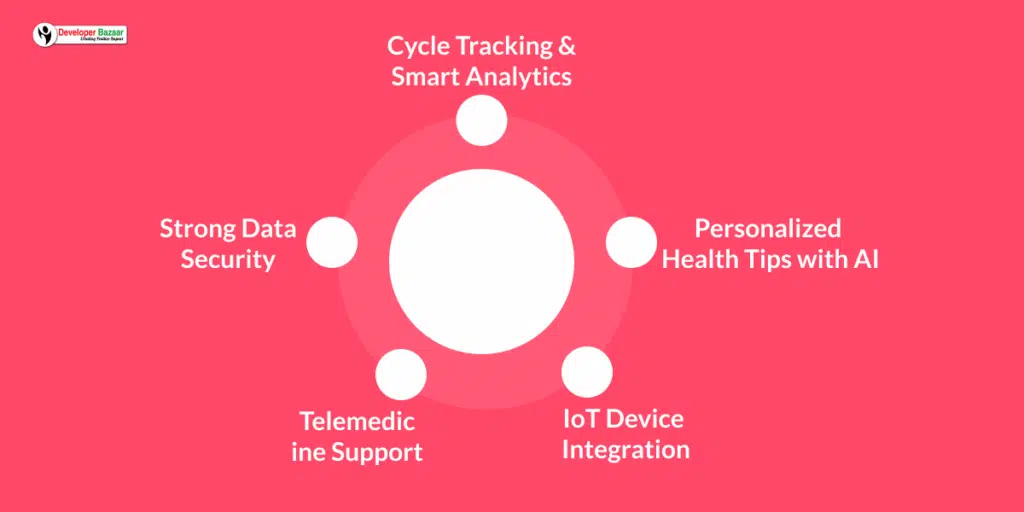
1. Cycle Tracking & Smart Analytics
Help users track periods, moods, and health patterns. Add AI tools to show predictions like next period, PMS symptoms, or fertility window. Use graphs and visuals to show health trends. This is a must-have for any period tracking app.
2. Personalized Health Tips with AI
Make your app smarter with AI-based suggestions. Give daily health advice based on user data like stress levels, sleep, or exercise. Personalized tips improve health outcomes and keep users engaged longer.
3. IoT Device Integration
Connect the app to wearables like smartwatches or fitness bands. Let users sync health data like sleep, heart rate, or activity levels. This makes your app more accurate and useful, especially for fitness and reproductive health.
4. Telemedicine Support
Let users consult doctors or experts directly from the app. Add video call features and secure chats for health questions. This is great for reproductive care, maternity advice, or menopause support.
5. Strong Data Security
Protect user data with powerful tools. Use end-to-end encryption and clear data-sharing options. Explain how data is used. Security builds trust and helps follow legal rules.
Types of FemTech Apps
There are many types of FemTech apps, each made to solve specific women’s health problems. Explore the most popular ones:
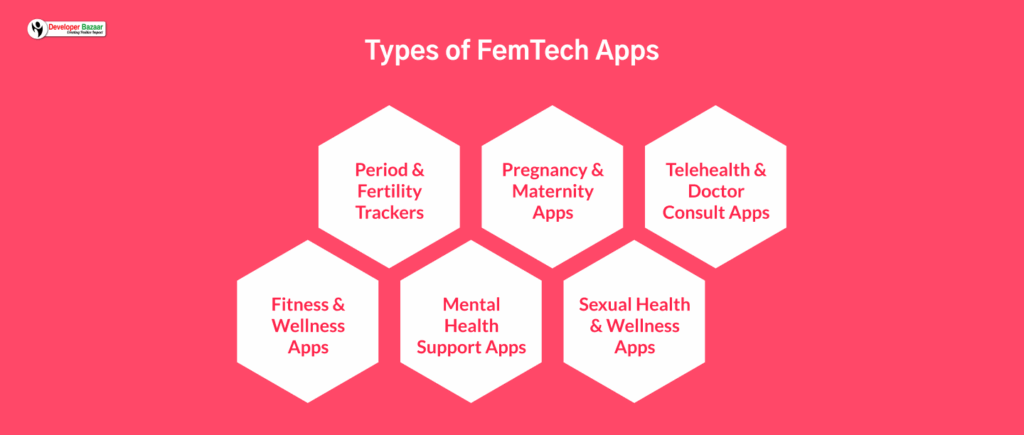
1. Period & Fertility Trackers
These apps track periods, ovulation, and symptoms. They help users plan their health and understand fertility cycles.
Example: Flo – Uses AI to give accurate period and ovulation predictions.
2. Pregnancy & Maternity Apps
Offer pregnancy tracking, baby growth updates, and health tips. They guide women through each week of pregnancy with helpful info.
Example: Sprout – Shows baby development and gives personalized advice.
3. Telehealth & Doctor Consult Apps
Let users book virtual appointments and chat with doctors. These apps are perfect for OB-GYN visits, therapy, and postpartum care.
Example: Maven Clinic – Offers online care from women’s health experts.
4. Fitness & Wellness Apps
Give fitness routines and diet plans made for women. They often include hormone tracking and cycle-based workouts.
Example: MyFitnessPal – Combines calorie tracking with personalized plans.
5. Mental Health Support Apps
Support emotional wellness, stress relief, and therapy. Include features like mood tracking, breathing exercises, or guided meditations.
Example: Apps with mood charts and therapy sessions for women.
6. Sexual Health & Wellness Apps
Promote pelvic health, education, and body awareness. Often include tips, safe sex guides, and pelvic floor exercises.
Example: B-Fit – Helps with pelvic muscle training and sexual health.
How Much Does It Cost to Develop a FemTech App?
The cost of developing a FemTech app depends on the features, design, and technology used. Here’s a basic breakdown:
- Simple App (Basic Tracker & Chat): $50,000 – $100,000
- Advanced App (AI + IoT + Telemedicine): $100,000 – $120,000+
FemTech Revolutionaries: 5 Ways Companies are Transforming Women’s Health
FemTech companies are changing the way women take care of their health. From periods to menopause, they are using smart tools to make life easier.
Here are five ways they are making a big difference:
1. Menstrual Health
Period-tracking apps like Clue and Flo help women know when their period will start. These apps also help detect health problems early. Many women now use reusable products like menstrual cups and period panties, which are eco-friendly and more comfortable.
2. Reproductive Health
Apps like Glow and Kindara help women track ovulation and plan for pregnancy. Women can also talk to doctors through their phones for birth control advice. This saves time and makes healthcare more reachable.
3. Pregnancy and Childbirth
During pregnancy, special vitamins and wearable devices like Bloomlife track the baby’s heartbeat and kicks. New moms also use apps like Lactation Link to get help with breastfeeding, even in the middle of the night.
4. Sexual Health
FemTech is helping women learn more about their sexual health. Apps like Natural Cycles and Maya track fertility and safe days. Smart devices from companies like Elvie and Lelo support pleasure and pain relief, making conversations about sexual wellness more open.
5. Menopause Care
FemTech helps women manage hot flashes, mood changes, and sleep problems during menopause. Products like cooling patches and CBD lubricants bring comfort. Apps also help track symptoms and improve sleep.
Top 5 FemTech Apps of 2025: Key Success Factors
These five apps are leading the FemTech industry in 2025. Let’s see what makes them successful:
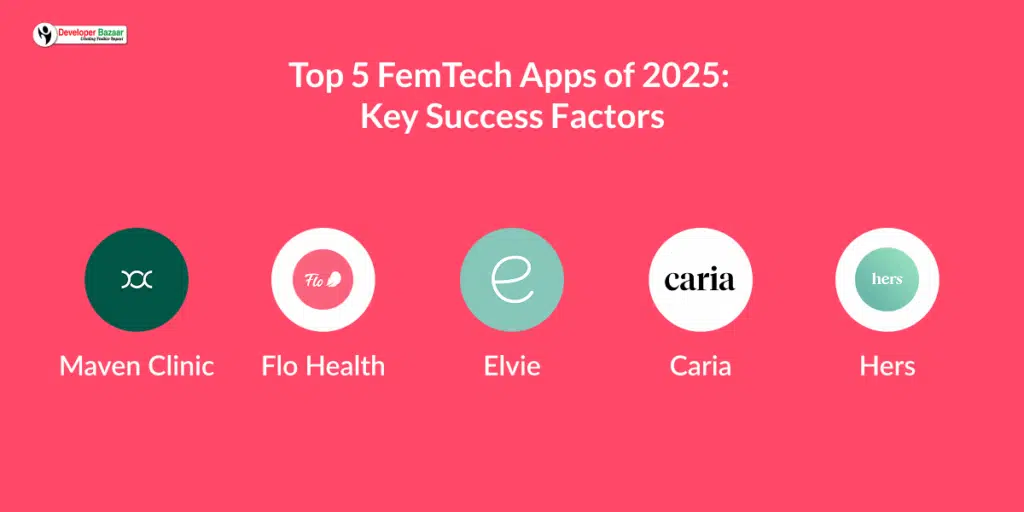
1. Maven Clinic - Best for Maternity Telehealth
Maven Clinic offers online care for pregnant women and new moms. It connects users with doctors and care teams from home. This helps reduce hospital visits and healthcare costs.
2. Flo Health - Smart Fertility and Period Tracker
Flo uses AI (Artificial Intelligence) to give health tips and track periods and fertility. It has over 250 million users. Personal insights and reminders keep users coming back.
3. Elvie - Smart Devices for Women
Elvie makes smart gadgets for pelvic health and breastfeeding. Their app works with their hardware, helping users track results. This mix of devices and apps creates a better health journey.
4. Caria - Menopause Wellness App
Caria helps women track symptoms and feel better during menopause. It offers expert tips and a support group. Focusing on this life stage builds strong user loyalty.
5. Hers - All-in-One Health Platform
Hers offers online services for mental health, skin care, and sexual wellness. The app is easy to use and respects privacy. Its wide range of services makes it popular among women.
Business Opportunities in FemTech
FemTech is growing fast. Here are some strong business ideas:
1. AI-Based Personal Health Tools
Use AI to create custom workout plans, cycle tracking, and health tips. Smart features help users take better control of their health.
2. Mental Wellness Apps
Build apps to support women with stress, anxiety, or sadness. Mental health in FemTech is growing by over 15% every year.
3. Low-Cost Apps for Rural Areas
Create offline apps for women in remote or low-income areas. Over 3.7 billion women lack access to basic healthcare.
4. Fertility and Pregnancy Solutions
Apps that track ovulation and offer expert help are in demand. The fertility tech market may grow to $23.3 billion by 2027.
5. Chronic Disease Management
Make apps for PCOS, endometriosis, and diabetes. Add trackers, learning tools, and doctor connections to support daily health.
Future of FemTech: Trends for 2025
The demand for FemTech App Development solution is growing fast and becoming more advanced.
In 2025, these key trends will shape the future of women’s health:
1. AI Personalization
AI will study each user’s health patterns and give customized advice. It will help women better understand their bodies and make smarter health choices based on personal data.
2. Wearable Devices
Developing a FemTech app will help by connecting with smartwatches and fitness bands to track heart rate, sleep, and other health signs in real time. This will help users monitor their health daily without much effort.
3. Telehealth Growth
More apps will let users talk to doctors online through video calls. This will make it easier and faster for women to get medical advice from home, especially for those in remote areas.
4. Global Access
Women Healthcare app development Solution will expand into developing countries where women often have limited healthcare access. Offline features and multi-language support will help reach more women around the world.
5. Focus on Chronic Issues
FemTech Apps will pay more attention to long-term conditions like menopause, PCOS, and endometriosis. These tools will offer tracking, expert tips, and emotional support to manage daily symptoms better.
Conclusion
FemTech is not just a trend, it’s a movement. From periods to menopause, it’s helping women take charge of their health like never before.
Smart FemTech app development, wearable devices, and telehealth platforms are shaping a healthier future for women around the world. Now is the perfect time to invest or innovate in FemTech.
FAQs
Q1. What does FemTech stand for?
A: FemTech means “Female Technology” apps and tools that support women’s health.
Q2. Why is FemTech important?
A: It gives women access to better, faster, and more personal healthcare options.
Q3. What are the top FemTech trends for 2025?
A: AI insights, wearable device syncing, telehealth, and support for chronic issues.
Q4. How big is the global FemTech market?
A: It’s growing fast and is expected to be worth billions in the next few years.
Q5. How long does it take to develop a FemTech MVP?
A: Usually 3 – 6 months, but with fast development tools, it can be done in 8–12 weeks.
Q6. Are FemTech apps regulated by health authorities?
A: Yes. Apps that give medical advice often need approval from bodies like the FDA.
Q7. How do FemTech apps keep data safe?
A: They use secure coding, data encryption, and follow privacy laws like HIPAA.
Q8. What’s one must-have feature in women’s health apps?
A: Easy to understand health tracking is key for daily use and long-term value.
Q9. Which FemTech startups focus on menopause?
A: Apps like Caria and Elektra Health are leading menopause care with digital tools.
Q10. Who invests in FemTech startups?
A: Health tech investors, venture capital firms, and women-focused funds are backing FemTech.

RM Mishra
Co-Founder
Developer Bazaar technologies
